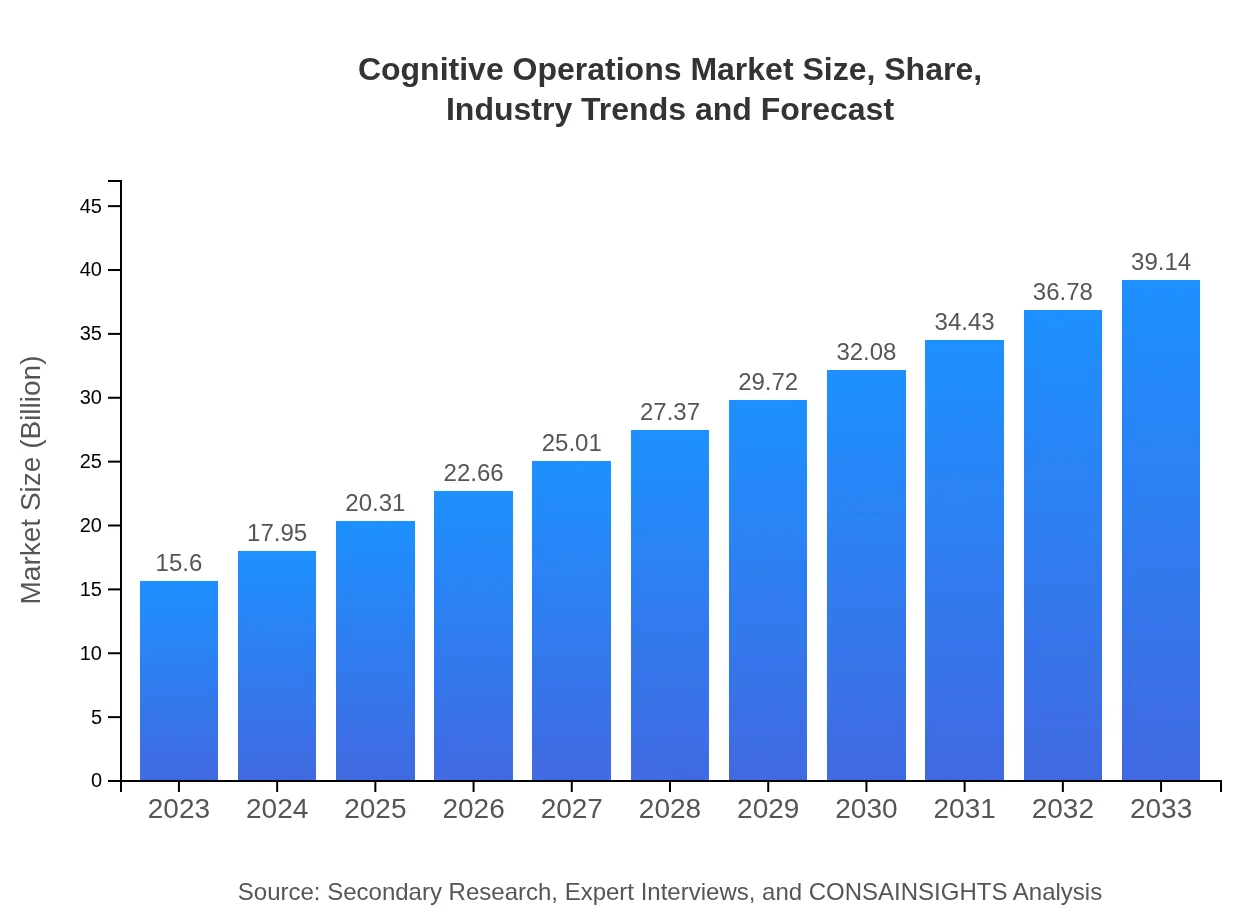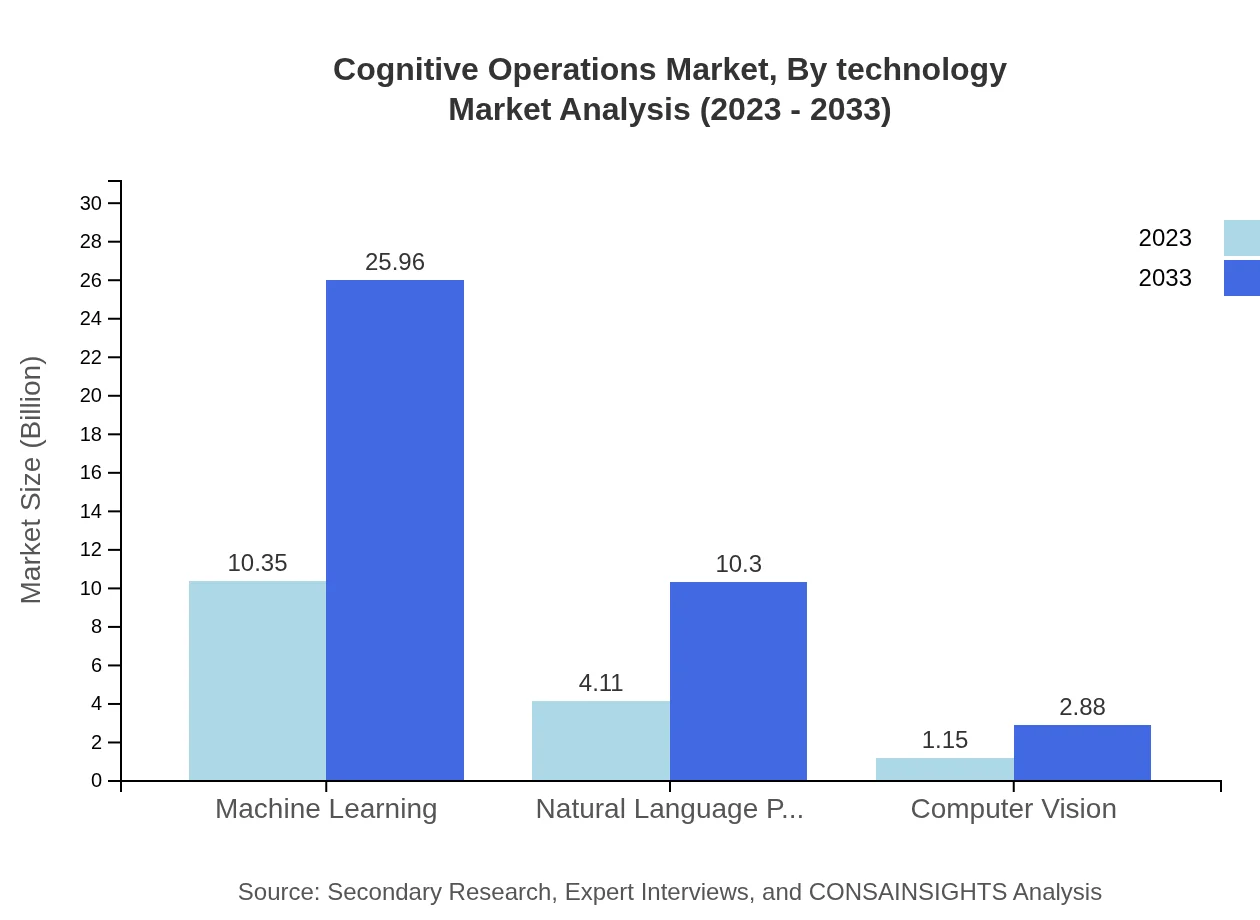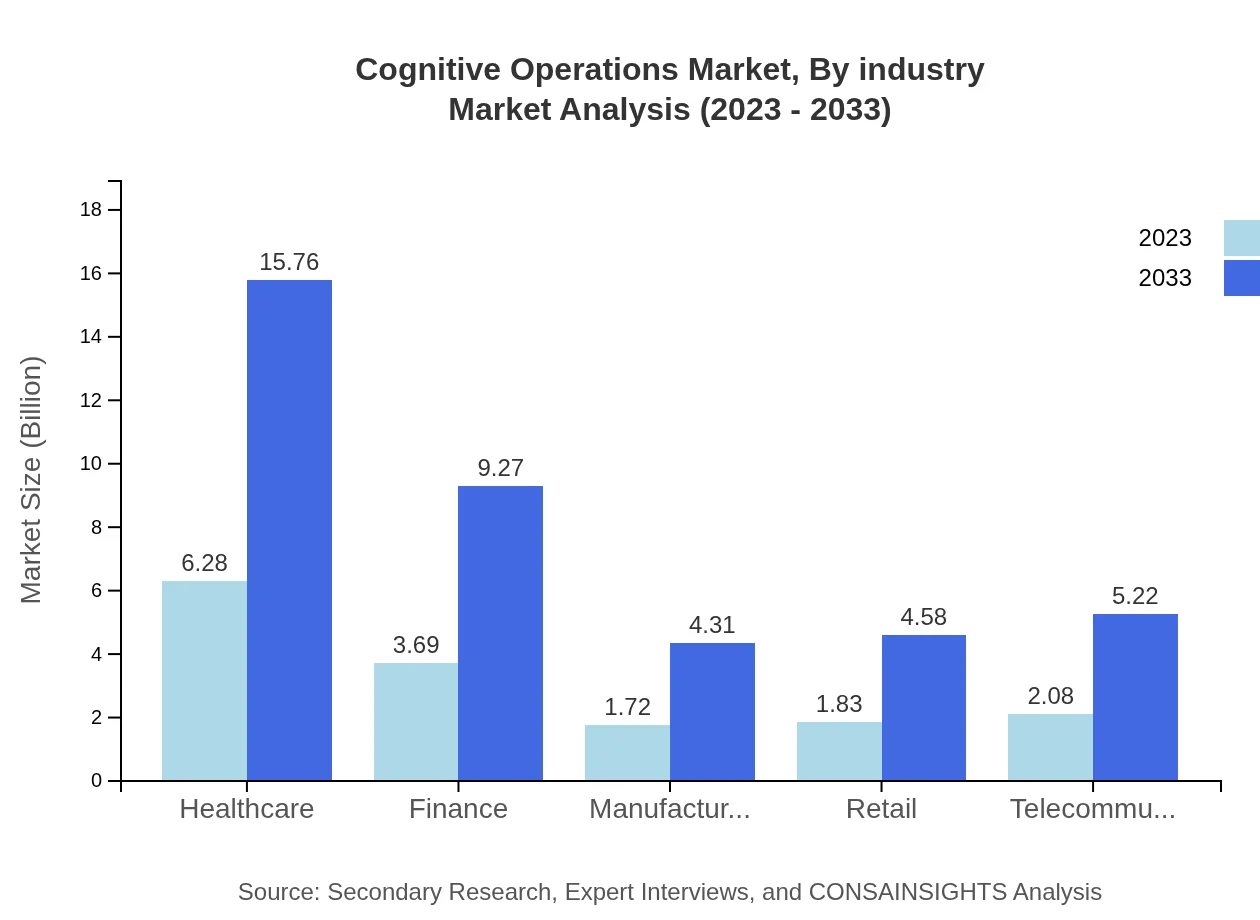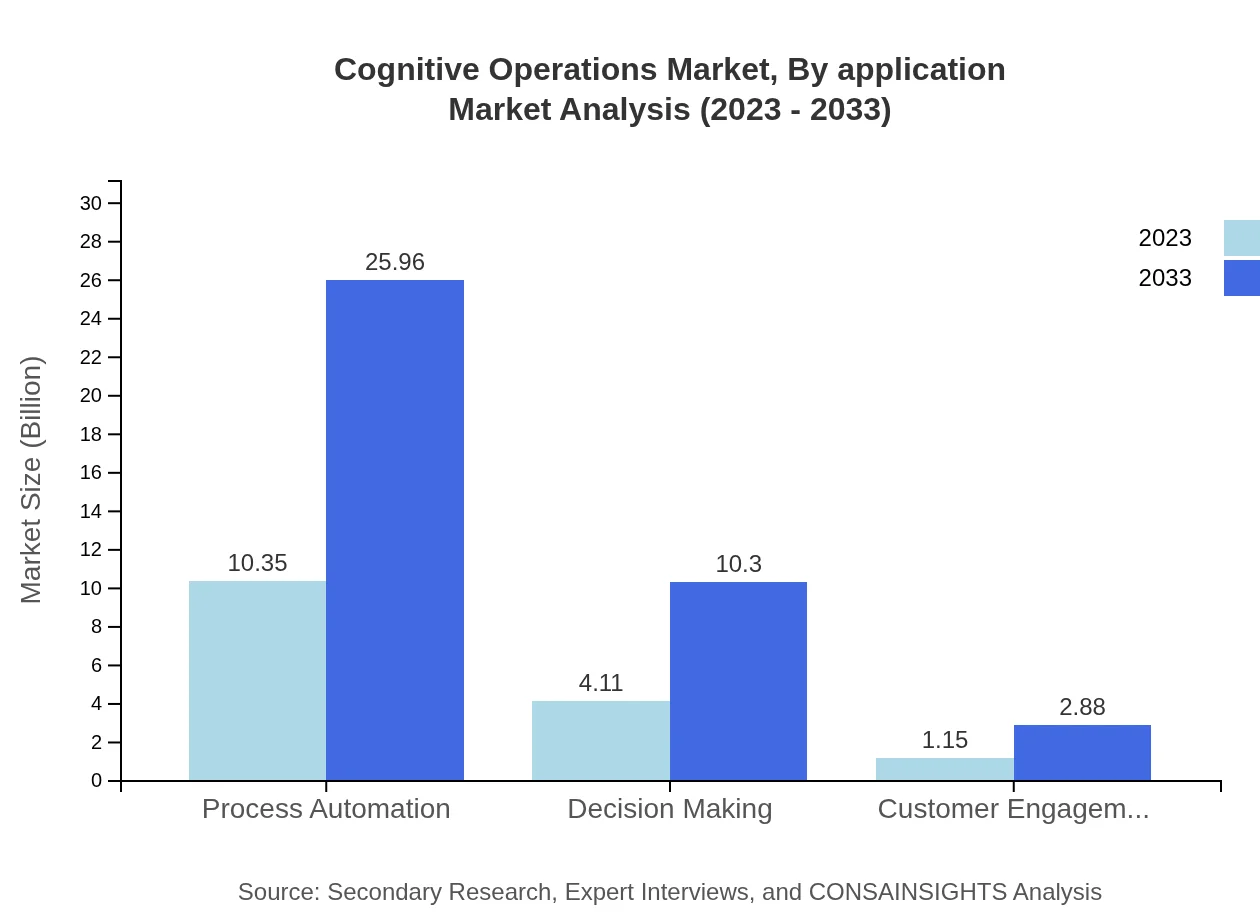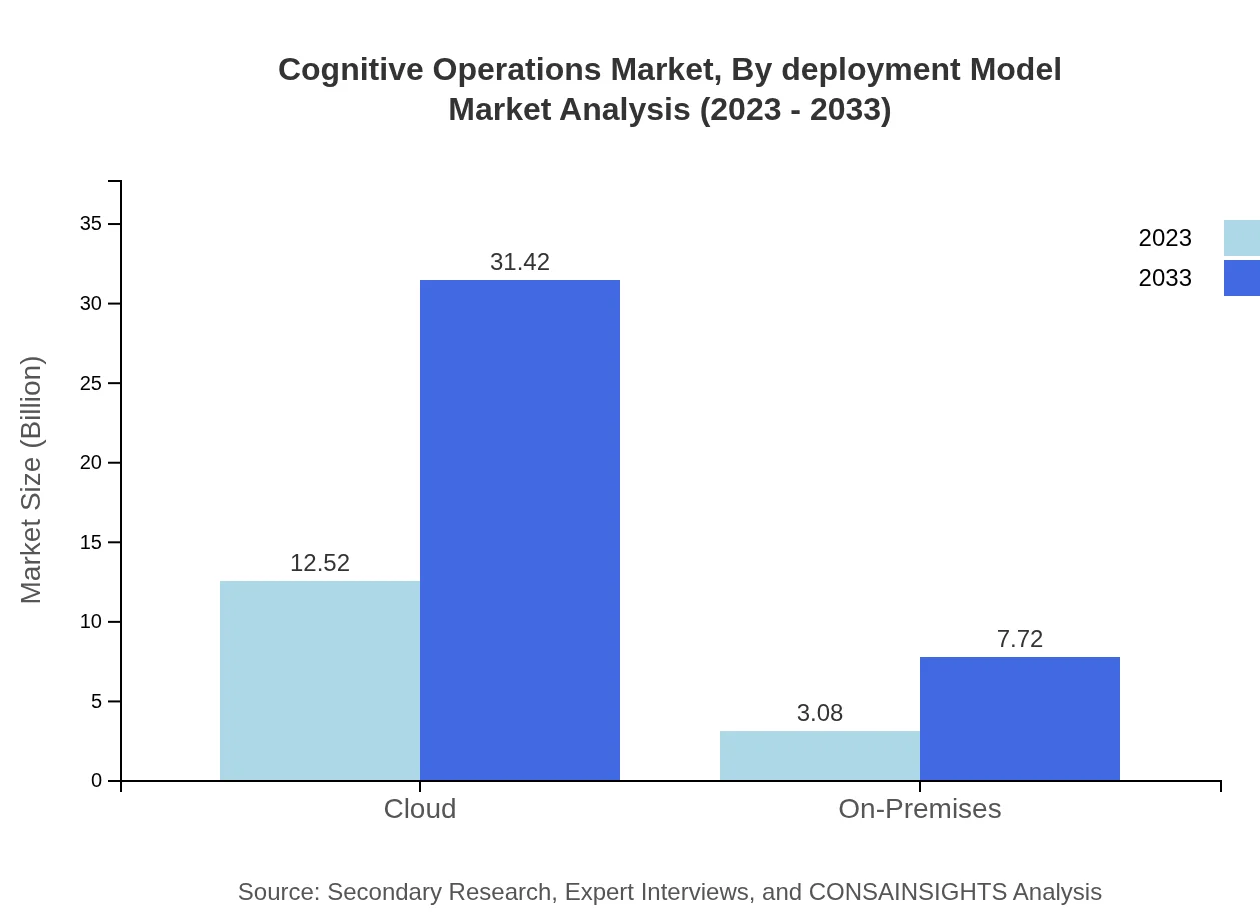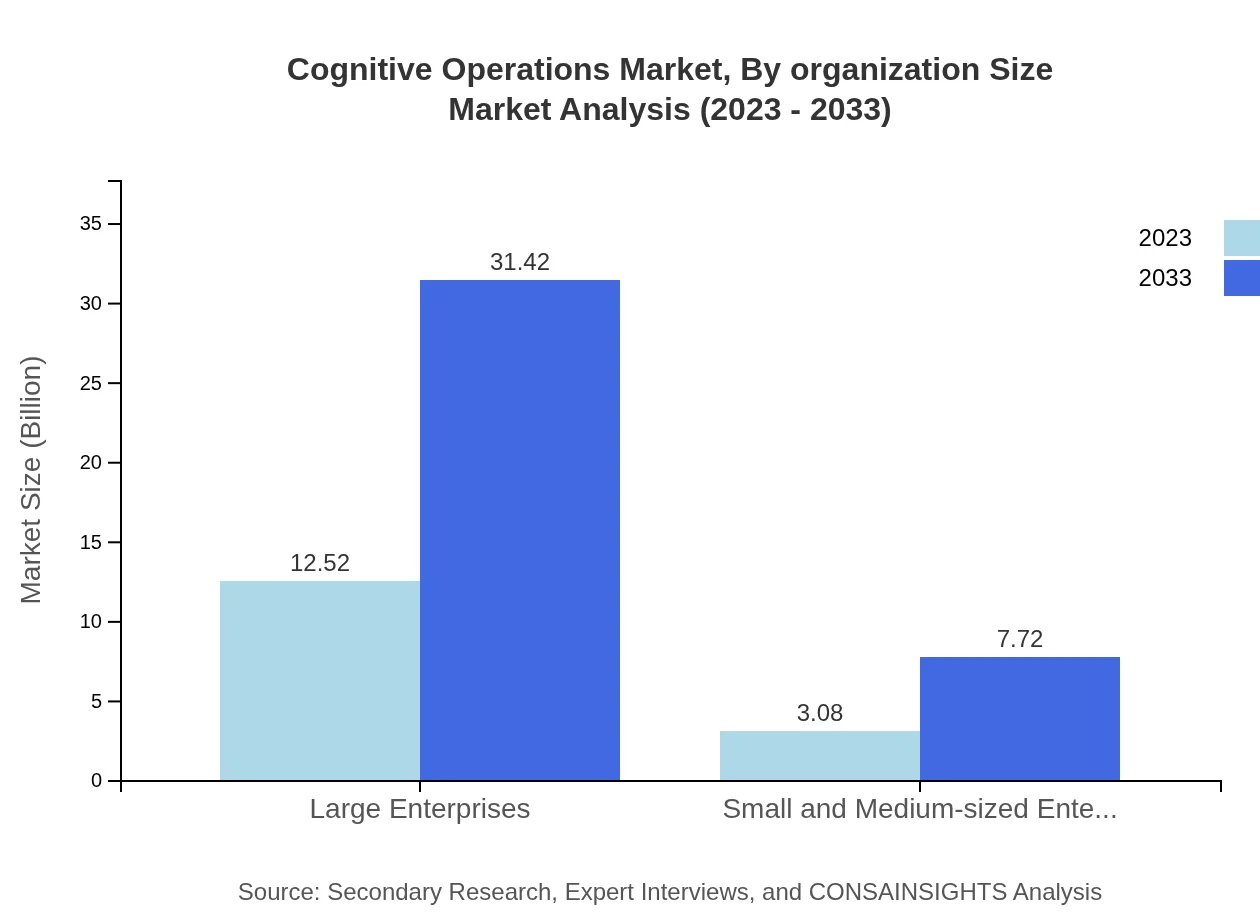Cognitive Operations Market Report
Published Date: 31 January 2026 | Report Code: cognitive-operations
Cognitive Operations Market Size, Share, Industry Trends and Forecast to 2033
This report provides a comprehensive analysis of the Cognitive Operations market, covering market size, growth rate, industry analysis, and regional insights. It aims to forecast trends and opportunities from 2023 to 2033.
| Metric | Value |
|---|---|
| Study Period | 2023 - 2033 |
| 2023 Market Size | $15.60 Billion |
| CAGR (2023-2033) | 9.3% |
| 2033 Market Size | $39.14 Billion |
| Top Companies | IBM, Microsoft, Google, SAP |
| Last Modified Date | 31 January 2026 |
Cognitive Operations Market Overview
Customize Cognitive Operations Market Report market research report
- ✔ Get in-depth analysis of Cognitive Operations market size, growth, and forecasts.
- ✔ Understand Cognitive Operations's regional dynamics and industry-specific trends.
- ✔ Identify potential applications, end-user demand, and growth segments in Cognitive Operations
What is the Market Size & CAGR of Cognitive Operations market in {Year}?
Cognitive Operations Industry Analysis
Cognitive Operations Market Segmentation and Scope
Tell us your focus area and get a customized research report.
Cognitive Operations Market Analysis Report by Region
Europe Cognitive Operations Market Report:
Europe's Cognitive Operations market is projected to grow from $3.97 billion in 2023 to $9.96 billion by 2033. Strict regulations regarding data privacy and heightened focus on automation in industries are encouraging organizations to shift towards cognitive solutions.Asia Pacific Cognitive Operations Market Report:
The Asia Pacific region is anticipated to witness substantial growth, with the market size projected to grow from $3.10 billion in 2023 to $7.78 billion by 2033. The increase is driven by government initiatives promoting digital transformation, as well as a rise in technology adoption among enterprises, particularly in countries like China and India.North America Cognitive Operations Market Report:
North America is currently the dominant region, with a market size of $5.65 billion in 2023, growing to $14.19 billion by 2033. The strong presence of major technology firms and investments in AI and machine learning drive this market, alongside increasing adoption from both large enterprises and SMEs.South America Cognitive Operations Market Report:
In South America, the Cognitive Operations market is expected to increase from $1.44 billion in 2023 to $3.60 billion by 2033. This growth is supported by an emerging digital economy, where organizations are increasingly adopting cognitive technologies to enhance efficiency and customer engagement.Middle East & Africa Cognitive Operations Market Report:
In the Middle East and Africa, the market is set to expand from $1.44 billion in 2023 to $3.60 billion by 2033, driven by advancements in IT infrastructure and growing investments in AI technologies to enhance organizational capabilities.Tell us your focus area and get a customized research report.
Cognitive Operations Market Analysis By Technology
Machine Learning stands out with a market size growing from $10.35 billion in 2023 to $25.96 billion by 2033, leading with a market share of 66.32%. Natural Language Processing is projected to expand from $4.11 billion to $10.30 billion, holding a market share of 26.32%. Process Automation follows with a similar share and estimated growth, reflecting the trend towards more automated operational strategies.
Cognitive Operations Market Analysis By Industry
The Healthcare sector leads with an expected rise in market size from $6.28 billion in 2023 to $15.76 billion by 2033, maintaining a steady market share of 40.27%. The Finance industry follows, with a growth trajectory from $3.69 billion to $9.27 billion, representing 23.68% market share, while Manufacturing and Retail display modest growth patterns, driven by increasing efficiency and competitiveness.
Cognitive Operations Market Analysis By Application
Key applications are focused on Decision Making and Customer Engagement, both expected to see growth from $4.11 billion to $10.30 billion and from $1.15 billion to $2.88 billion respectively. These segments emphasize the necessity for enhanced analytical capabilities in business operations.
Cognitive Operations Market Analysis By Deployment Model
The Cloud deployment model dominates, anticipated to escalate from $12.52 billion in 2023 to $31.42 billion by 2033, capturing an 80.28% market share. On-Premises solutions are also growing but at a much slower rate, illustrating the preference for scalable and flexible cloud solutions in modern business environments.
Cognitive Operations Market Analysis By Organization Size
Large Enterprises are expected to expand from $12.52 billion to $31.42 billion in the coming years, reflecting an 80.28% market share due to significant resource availability for technological investments. Meanwhile, SMEs are projected to transition from $3.08 billion to $7.72 billion, showcasing adaptability and growth potential in cognitive technologies.
Cognitive Operations Market Trends and Future Forecast
Tell us your focus area and get a customized research report.
Global Market Leaders and Top Companies in Cognitive Operations Industry
IBM:
IBM is a leader in AI and cognitive computing with its Watson platform, providing a range of cognitive solutions to enhance business operations and decision-making.Microsoft:
Microsoft is at the forefront of AI innovation, offering sophisticated cognitive services through its Azure platform, facilitating automation and data-driven insights.Google:
Google has a strong presence in the cognitive operations market, leveraging its AI and machine learning capabilities across various industries to improve efficiency and productivity.SAP:
SAP provides a variety of cognitive solutions aimed at enhancing business intelligence and operational performance, focusing on integration with their ERP systems.We're grateful to work with incredible clients.









FAQs
What is the market size of cognitive Operations?
The cognitive operations market is valued at approximately $15.6 billion in 2023, with a projected compound annual growth rate (CAGR) of 9.3%. This growth indicates robust demand and an expanding market presence over the next decade.
What are the key market players or companies in this cognitive Operations industry?
Key players in the cognitive operations industry include major tech companies like IBM, Microsoft, and Google, which are driving innovation through AI and automation solutions. Their extensive expertise in machine learning and cloud computing impacts the market greatly.
What are the primary factors driving the growth in the cognitive operations industry?
Growth in cognitive operations is primarily driven by increasing data volume, the demand for automation, and advancements in AI technologies. The need for improved decision-making processes and enhanced customer engagement also contributes significantly.
Which region is the fastest Growing in the cognitive operations?
The fastest-growing region in the cognitive operations market is North America, expected to grow from $5.65 billion in 2023 to $14.19 billion by 2033. Europe and Asia-Pacific also show substantial growth rates, indicating a global expansion.
Does ConsaInsights provide customized market report data for the cognitive Operations industry?
Yes, ConsaInsights offers customized market report data tailored to specific needs in the cognitive operations industry. This includes detailed insights and analyses based on unique requirements and market conditions.
What deliverables can I expect from this cognitive Operations market research project?
Deliverables from the cognitive operations market research project typically include comprehensive reports, market forecasts, competitive analysis, and segmentation details. Clients can expect actionable insights for strategic decision-making.
What are the market trends of cognitive operations?
Key market trends in cognitive operations include a shift towards AI-driven solutions, increased focus on customer personalization, and greater adoption of cloud services. These trends reflect a growing integration of technology in business operations.

